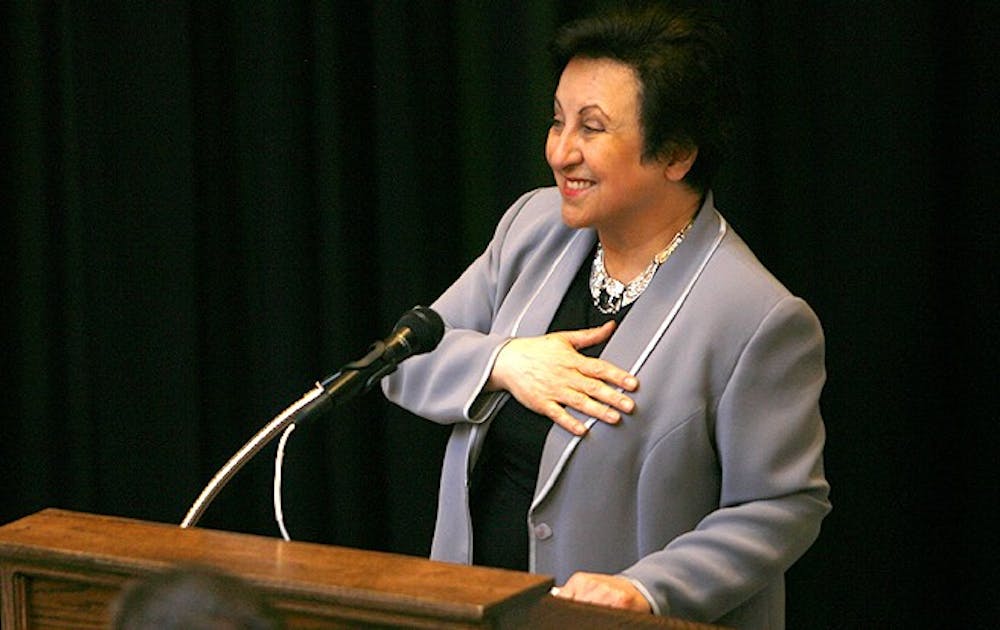The United States should help Iranian human rights activists in their efforts to attain a more democratic society, said Shirin Ebadi, recipient of the 2003 Nobel Peace Prize.
Ebadi, an Iranian lawyer and academic, discussed challenges to promoting human rights in Iran at the Sanford School of Public Policy Monday. Speaking through a translator, Ebadi emphasized that human rights abuses have increased in Iran since the Green Revolution—a series of protests following the 2009 presidential election—and, as a result, the United States should continue pressuring Iran, even if the country halts nuclear proliferation.
Ebadi noted that oppression in theocracies like Iran raises an important question as to whether Islam is compatible with human rights.
“The non-democratic Islamic governments believe that human rights is a Western concept and is not compatible with Islam,” Ebadi said. “This is how they justify their suppression of their people.”
Rulers in Iran, Bahrain, Syria and some other Middle Eastern countries abuse Islam’s tenants to justify oppressing women, limiting free speech, curtailing the right of assembly and resisting democracy, she said. This interpretation of Islam—one that does not respect the concept of “majority rule, minority rights”—is flawed.
“With a correct interpretation of Islam, we can respect human rights and democracy,” she said. “And Muslims should not permit their non-democratic governments to abuse the name of Islam.”
Born in 1947, Ebadi was raised in Tehran and became one of the first female judges in Iran. She served on the bench until she was demoted to clerk after the success of the Islamic Revolution in 1979. Despite this setback, Ebadi risked imprisonment to promote the rights of women and children in Iran and co-founded the Defenders of Human Rights Center in 2001. She has been living in exile in the United Kingdom since June 2009.
Ebadi has claimed national attention for her efforts in human rights. Forbes magazine listed her as one of top 100 most powerful women in the world in 2004. She has also garnered a number of honorary doctorate degrees, including at the University of Toronto, the University of San Francisco and the University of Akureyri in Iceland.
Ebadi, the author of three books, cited numerous human rights abuses in Iran. Discriminatory laws—such as laws that give child custody to the father—are constantly used to limit the prospects for women. Drinking alcohol is punishable by flogging, and—on third offense—execution. Adherents to the Baha’i Faith are constantly persecuted. Perhaps most striking of all, if a non-Muslim has sexual relations with a Muslim out of wedlock, the offenders are sentenced to death immediately, she said.
“After China, we have the largest number of executions in the world,” Ebadi said. “With regard to the fact that the population in China is over a billion and that of Iran is only 75 million, if we look at the per capita, Iran has many more executions.”
Although Ebadi is against military action or external intervention, she said the United States and other countries can do more to help Iranian human rights activists.
If Iran halts nuclear proliferation, the United States may stop pressuring the Iranian government, Ebadi added.
She said she is especially concerned about statements made during nuclear talks in Istanbul last week. Before the conference, Secretary of State Hillary Clinton said the United States would make assurances to Iran if the regime decides to halt its nuclear program.
“I want to ask the kind people of America to give me their hand for help,” Ebadi said. “Help the people of Iran improve the situation of human rights. Do not permit your politicians to sacrifice human rights at the time that they are concluding economic agreements or negotiating nuclear issues.”
Seth Cantey, a doctoral candidate in international relations , said he is unsure whether the U.S. can effectively pressure Iran to halt nuclear proliferation if it tries to deal with human rights issues at the same time.
“Ebadi helped the audience grapple with some of the difficult decisions that face policymakers and some of the tensions between human rights and democracy,” he said. “The difficulty is that the nuclear problem is so urgent that it may not be realistic to link it to human rights right now.”
The speech—this year’s Crown Lecture in Ethics—was sponsored by the Sanford School and the Duke University Union.
Get The Chronicle straight to your inbox
Signup for our weekly newsletter. Cancel at any time.

